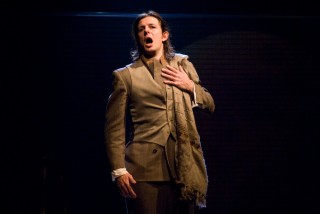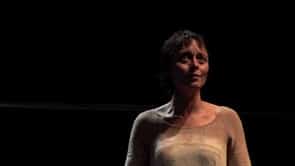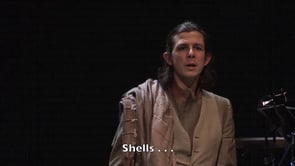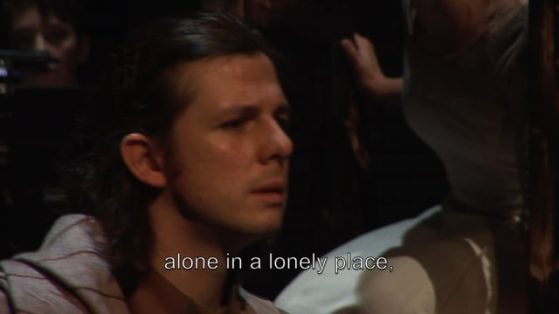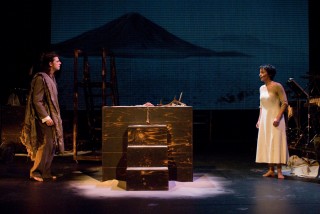Black Feather Rising
Music Theatre for 2 Singers and 6 Instrumentalists
LINK TO: Link
YEAR: 2008
ORCHESTRATION: fl./cl./perc./harp/vln. dbl. vla/vc
DURATION: 90′
LANGUAGE: English
LIBRETTO BY: David Rudkin
SOLOIST(S): Soprano and Baritone
COMMISSIONED BY: Stichting Octopus (The Netherlands)
DEDICATION: Godelieve Schrama
AVAILABILITY: For more information, please contact the composer.
PREMIERE DATE: October 24, 2008
PREMIERE INFORMATION:
De Toneelschuur – Haarlem (NL), followed by a tour throughout the Netherlands.
PERFORMERS AND TEAM OF FIRST PRODUCTION
| Charlotte Riedijk | soprano |
| Alistair Shelton-Smith | baritone |
| Jana Machalett/Marieke Franssen | flute/piccolo/alto flute |
| Lars wouters van den Oudenweijer | clarinet/bass clarinet/contrabass clarinet |
| Godelieve Schrama | harp |
| Wim Vos | percussion |
| Marijke van Kooten | violin/viola |
| Doris Hochscheid | violoncello |
| Jos van Kan | director |
| Lieke van Hoogenhuyze | assistant |
| Berthe Spoelstra | dramaturgy |
| Michiel Voet | scenery |
| Dorien de Jonge | costumes |
| Desiree van Gelderen | light design |
| Sepp Grotenhuis | correpetitor |
| Jonathan Berman | rehearsal coach |
| Holger Breek | technician |
| Michel Weekhout | stage management |
| Kees Kaya | production |
| Annemarie Reitsma | sales |
BRIEF SYNOPSIS
At a tribal gathering, a young man and young woman see each other, and fall in love. But she, West-Wind-Rising, is married with a child. He, Raven Caller, is in subjection to a witch who, in her jealous fury, punishes him with the loss of his memory and magical powers. But in his unconscious, his song of love sings on. West-Wind-Rising, guided by it, sets out on a difficult and dangerous journey to find him. Her way brings her toward the mysterious Black Feather Mountain, from where his song seems to be coming. As she clambers down a sheer rock-face, a raven attacks her, and she falls. Raven Caller finds her broken body almost lifeless. Once, with his healing powers, he could have restored her. Now he does not even recognize her; he cannot remember even his own name . . . In one continuous scene, the drama shows how they re-awaken each to the other, and by the miracle of love their lives and powers are restored.
The story is developed from a Native American legend, and is here re-worked as an inner dramatic journey for its two main characters. Black Feather Mountain is music theatre with a quality of myth, inhabiting an elemental world of forest, rock, wind and birds, where human senses are still tuned in to the voices and wisdom of Nature around them, and song is everywhere. The continuous action is an ascending curve of raw human emotion, from yearning, up through pain, terror, desolation, anger, to a climax of wonder and joy. In a contemporary culture of noise, activity and ‘information’, it re-asserts the primacy of each individual human quest, the search within.
See also
DAVID RUDKIN: Wayward seeming but unerring: the strange genesis of Black Feather Rising
LIBRETTO EXTRACT FROM THE OPENING:
[Along a high rocky edge a young woman searches in distress for a way down. Her hair is roughly lopped, her clothing ripped, her hands arms face feet torn and bleeding. A pouch hangs by a thong about her neck.]
She:
No way down.
From this high rock,
no path.
All my journey:
here it ends.
[She sinks aside, dispirited.]
Each step of the way the earth has fought me.
Turn back! the forest said.
Its branches sprang in my face:
Turn back, turn back!
Its thickets ripped my hands and arms:
Back to your people and your village,
to your child . . .
Its thorns clawed at my hair:
How can you leave your husband and your child . . .
A woman does not do this.
I hagged my hair off to tear free of the thorns.
I do this.
I, West-Wind-Rising, I do this.
I go to find a man I do not know.
All of him I know
is his song the night wind brings me . . .
But what way forward to him now? . . .
[She searches; in vain . . . Apart on the space, an obscure form like a mound of rags. From it, a man’s voice begins to sing: ]
He:
Lady, hear me . . .
Wherever you are,
hear me where I lie sleeping . . .
She:
All next day long, my journey said Go back!
High desert of rock . . .
upward . . .
unending:
Go back! Go back!
Scorch of the Sun,
the searing wind:
Go back to your husband and your baby!
The sharp rock tore at my feet:
Back to your baby . . . Back to your baby . . .
I fought the wind and the Sun and the knives of rock.
I come to find a man I do not know.
All I have of him
is in this pouch I carry:
a string of shells
one day a raven brought me . . .
a raven brought me . . .
as I looked out from my husband’s door
across the world in yearning.
A string of shells
from around the neck of a man I do not know.
Only the once I ever saw him.
Across that wedding dance he looked at me.
Our eyes met.
He smiled.
I knew.
[In the mound of rags a restlessness, a struggling; again the man’s voice sings:]
He:
Lady hear me.
Only the once I ever saw you.
Across that wedding dance you looked at me.
You smiled.
I knew.
[Libretto Copyright © David Rudkin, 2007. Used by permission.]
de Volkskrant (28 October 2008)
Reviewer: Lonneke Regter
Windvlaagjes, ruisende bomen, vogelgeluiden, een klagende basklarinet, smachtende cellozuchten en ingewikkelde harppatronen: natuurkrachten versus zielenroerselen staan centraal in Black Feather Rising, een nieuwe kameropera van Param Vir. De componist, Indiaas van afkomst en sinds Londen woonachtig, schreef het stuk voor Stichting Octopus, een initiatief van onder anderen Schrama.
Black Feather Rising, gebaseerd op een Amerikaans-Indiaanse legende waarin twee geliefden een innerlijke zoektocht maken om bij elkaar te komen, ging afgelopen weekend in première. Het verhaal speelt zich af rond een mysterieuze berg, Black Feather Mountain, waar raven en ravenveren een sleutelfunctie vervullen – zondag in de Amsterdamse Meervaart geprojecteerd op de muur van de Blauwe Zaal. Twee zangers werden omringd door zes musici op houten blokken. Die blokken deden aan rotsen denken, maar hun opstelling had ook een muzikaal effect: die onderstreepte introverte muziek, waarin de instrumenten solistische rollen spelen.
De opera begint met enkele monologen van een sopraan, West-Wind-Rising (), die in steeds gelijkblijvend register haar barre tocht bezingt. Zij verliet haar man en kind voor Raven Caller (de bariton Alistair Shelton-Smith), die zij ooit ontmoette op een feest. Probleem: Raven Caller is zijn geheugen en zijn magische krachten kwijt door zijn stiefmoeder. Hij kan echter smeken, haten en liefhebben in melodieën van een enorm bereik, met coloraturen zelfs. In de subtiele, nooit agressieve muziek van Vir komen Rudkins eerder beschrijvende dan poëtische tekst duidelijk naar voren.
Jos van Kan helpt mee: handelingen blijven beperkt tot een stapje op een tree, of, als de zoekende West-Wind-Rising in een ravijn valt, een ineenkrimpen onder een mobiel laddertje.
Kneuterigheid ligt op de loer in Black Feather Rising, maar Shelton-Smith voorkomt dat met kleine gebaren en een rijke, veelzijdige stem. Hij is de dragende factor in deze kleinschalige voorstelling.
Editie Groene Hart (3 November 2008)
Reviewer: Marc Couwenbergh
Een onmogelijke liefde is geen uitvinding van Shakespeare, De oorspronkelijke bewoners van Noord-Amerika hebben hun eigen Romeo en Julia. Al eeuwen vertellen ze elkaar het verhaal van West Wind Rising, een getrouwde vrouw met kind, die zich aangetrokken voelt tot Raven Caller, een man van een andere stam. Ze ontmoeten elkaar op een bruiloftsfeest en zonder een woord te wisselen, lezen ze in elkaars ogen hun liefde. Maar het gewone leven gaat door. Toch kan West Wind Rising de man niet vergeten. In haar dromen hoort ze hem zingen en ze besluit om haar man en kind achter te laten om op zoek te gaan naar haar grote liefde. Een zwarte veer gaat haar vooruit. West Wind Rising vindt haar liefde maar voordat ze werkelijk samen aan een nieuw leven kunnen beginnen, moeten beiden afrekenen met spookbeelden uit hun verleden.
Stichting Octopus, een initiatief van drie Nederlandse musici, maakte van dit oude Indiaanse verhaal hedendaags muziektheater voor twee zangstemmen en zes musici; een kameropera. De uit India afkomstige componist Param Vir schreef de muziek. Vir benadrukt dat zijn afkomst niet van belang is voor zijn muziek. Hij is inderdaad een van die moderne kunstenaars die zich los hebben gemaakt van hun afkomst en een wereldwijde taal van kunst en muziek zijn gaan ontwikkelen. De muziek van Black Feather Rising is kleurrijk en expressief en alles draait om de klanken. Harp, viool, cello, fluit, klarinet en slagwerk realiseren een onvermoede veelheid aan klanken die zowel de gemoedsstemmingen van de twee geliefden verbeelden als de overweldigende natuur waarin het verhaal zich afspeelt. Het kan knarsen en schuren, maar ook twinkelen en helder klateren.
De intensiteit en de concentratie waarmee de zes musici spelen, versterkt hun muziek. De afwezigheid van een dirigent maakt dat ze volledig op elkaar aangewezen zijn. Elk zit op een apart hoog blok langs de zijkanten van het toneel, als het landschap met bergen waar het verhaal zich afspeelt. Het libretto is vertellend maar kent ook prachtige zinnen die, gezongen door de heldere stemmen van de sopraan Charlotte Riedijk en de jonge Engelse bariton Alistair Shelton-Smith, je bijblijven. Met deze ‘Black Feather Rising’ heeft Octopus een juweeltje toegevoegd aan het operarepertoire.

